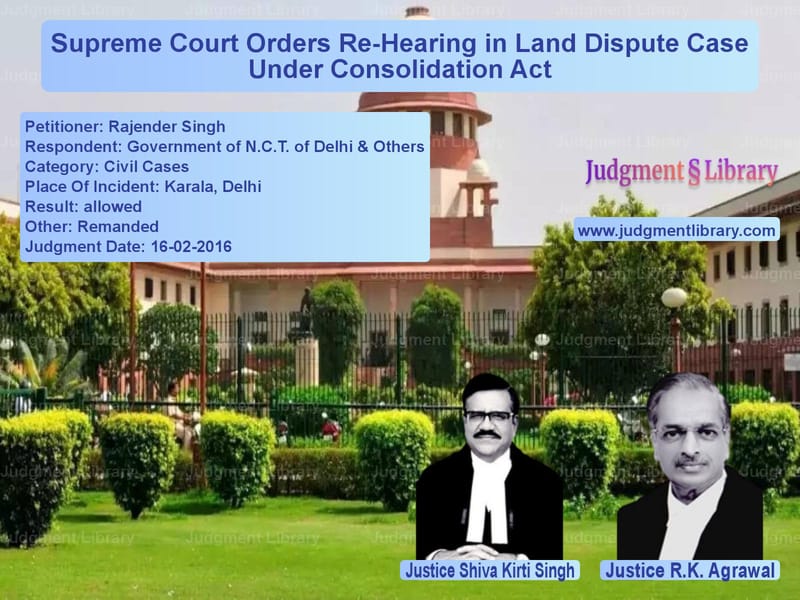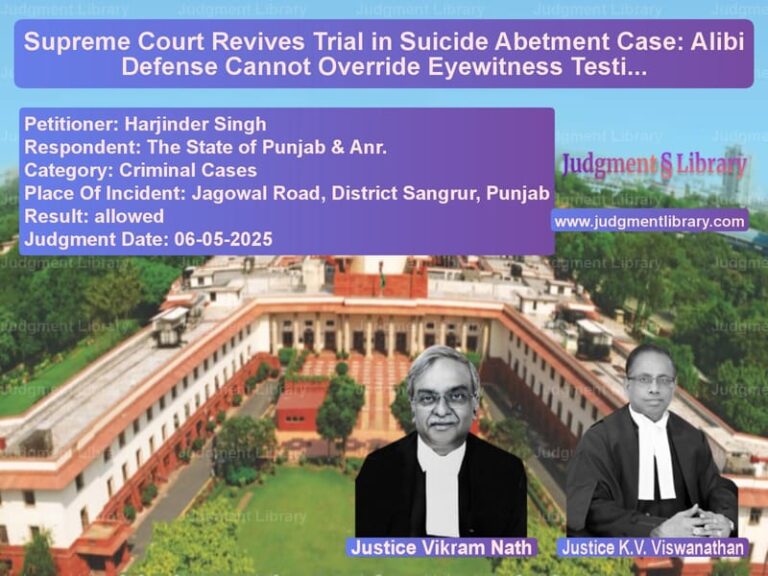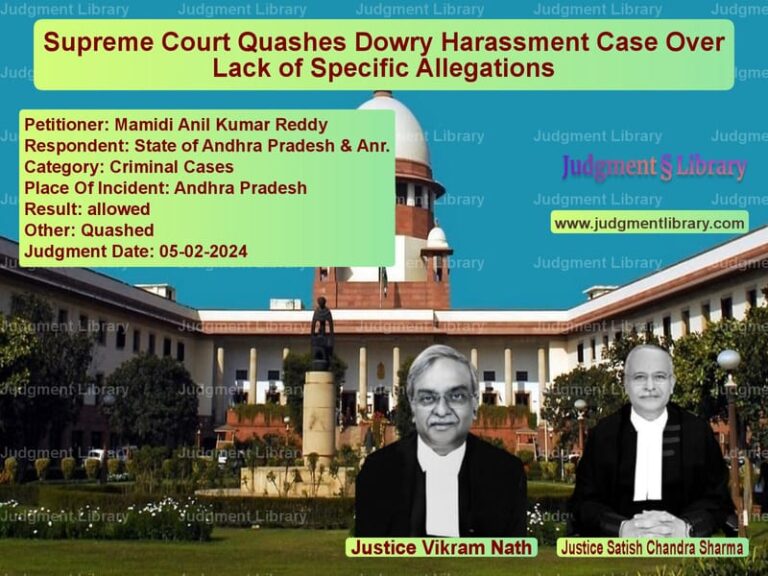Supreme Court Orders Re-Hearing in Land Dispute Case Under Consolidation Act
The case of Rajender Singh vs. Government of N.C.T. of Delhi & Others pertains to a long-standing land dispute arising under the East Punjab Holdings (Consolidation and Prevention of Fragmentation) Act, 1948. The Supreme Court reviewed whether the consolidation officer had properly exercised jurisdiction in allotting land decades after the original consolidation proceedings were completed.
Background of the Case
The dispute originates in Village Karala, Delhi, where consolidation proceedings under the 1948 Act were conducted between 1975 and 1976. More than 23 years later, in 1999, certain respondents filed an application under Section 43A of the Act, seeking allotment of land from Khasra No. 168. They claimed that their late father had been in possession of 11 biswas of this land during consolidation and that their rights had been recorded as “Scheme Kabizan” in the consolidation scheme.
The Consolidation Officer initially dismissed the application on May 11, 1999, ruling that the proceedings had concluded long ago and he had no jurisdiction to reopen the matter. However, this decision was reversed by the Financial Commissioner, who held that the Consolidation Officer still had jurisdiction under Section 43A.
Subsequent Proceedings
The matter was remanded, but procedural irregularities followed:
- On October 4, 2004, the Consolidation Officer ordered notices to be issued to legal heirs of one Baljit Singh but did not fix a subsequent date for hearing.
- On October 18, 2004, the order recorded service of notices but did not mention whether Rajender Singh (the appellant) or his counsel were present.
- On December 24, 2004, the Consolidation Officer ruled in favor of the respondents, allotting them 11 biswas of land in Khasra No. 168 based on the “Scheme Kabizan” entry.
The appellant challenged this decision, arguing that:
- No proper hearing was granted.
- The claim was made 23 years after consolidation ended.
- There was no clear proof that their late father’s possession was legally recognized.
High Court’s Decision
Rajender Singh filed a revision petition before the Financial Commissioner, which was dismissed on February 3, 2009. He then approached the Delhi High Court, first before a Single Judge and later through a Letters Patent Appeal (LPA). Both petitions were dismissed, leading to this appeal before the Supreme Court.
Supreme Court’s Analysis
1. Lack of Proper Hearing
The Supreme Court observed that:
- The order dated December 24, 2004, did not show that Rajender Singh or his counsel were present.
- The hearing record only mentioned the presence of the respondents.
- The claim that the appellant’s counsel argued the case at length was either a mistake or casual remark.
On this ground alone, the Court ruled that the case must be remanded for fresh hearing.
2. Validity of “Scheme Kabizan” Entry
The Court directed that the Consolidation Officer must examine:
- Whether the “Scheme Kabizan” entry was properly published and whether objections were invited.
- If this entry was later acted upon in official revenue records.
- Whether the possession claimed was of a lawful nature or a mere encroachment.
3. Delay of 23 Years
The Court noted that:
- Under Mange Ram v. Financial Commissioner (2003), a claim based on mere possession cannot be entertained after such a long delay.
- The respondents claimed continued possession, but no clear evidence supported this.
- The delay factor must be weighed carefully in light of the nature of possession.
Final Judgment
The Supreme Court allowed the appeal and ordered:
- The High Court’s decision was set aside.
- The orders of the Consolidation Officer and Financial Commissioner were quashed.
- The case was remanded for fresh hearing within six months.
- The Consolidation Officer must consider the issues outlined by the Court.
Impact of the Judgment
The ruling reaffirms key legal principles:
- Land consolidation decisions must follow due process.
- Long delays in claims must be scrutinized.
- Affected parties must be given a fair opportunity to present their case.
Conclusion
The Supreme Court’s decision in Rajender Singh vs. Govt. of N.C.T. of Delhi emphasizes procedural fairness in land consolidation cases. By ordering a fresh hearing, the Court ensures that land disputes are resolved based on evidence and due process rather than administrative lapses.
Don’t miss out on the full details! Download the complete judgment in PDF format below and gain valuable insights instantly!
Download Judgment: Rajender Singh vs Government of N.C.T. Supreme Court of India Judgment Dated 16-02-2016-1741852659875.pdf
Direct Downlaod Judgment: Direct downlaod this Judgment
See all petitions in Property Disputes
See all petitions in Landlord-Tenant Disputes
See all petitions in Succession and Wills
See all petitions in Judgment by Shiva Kirti Singh
See all petitions in Judgment by R K Agrawal
See all petitions in allowed
See all petitions in Remanded
See all petitions in supreme court of India judgments February 2016
See all petitions in 2016 judgments
See all posts in Civil Cases Category
See all allowed petitions in Civil Cases Category
See all Dismissed petitions in Civil Cases Category
See all partially allowed petitions in Civil Cases Category







